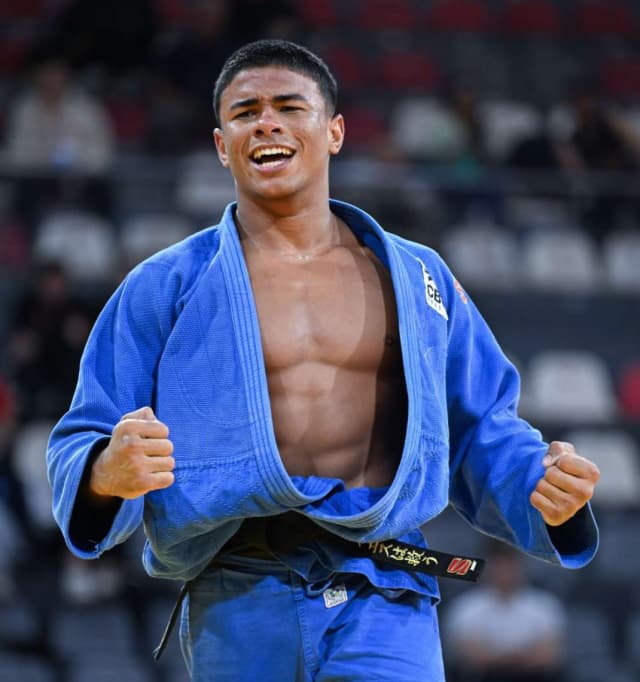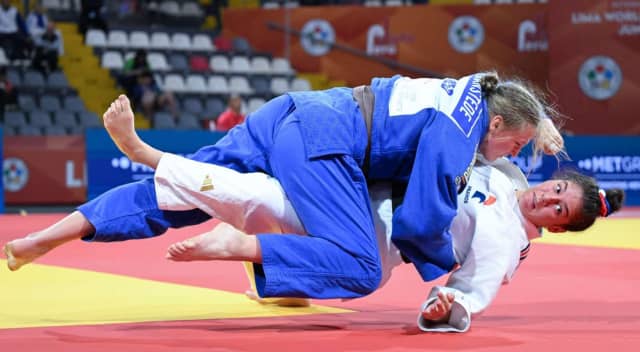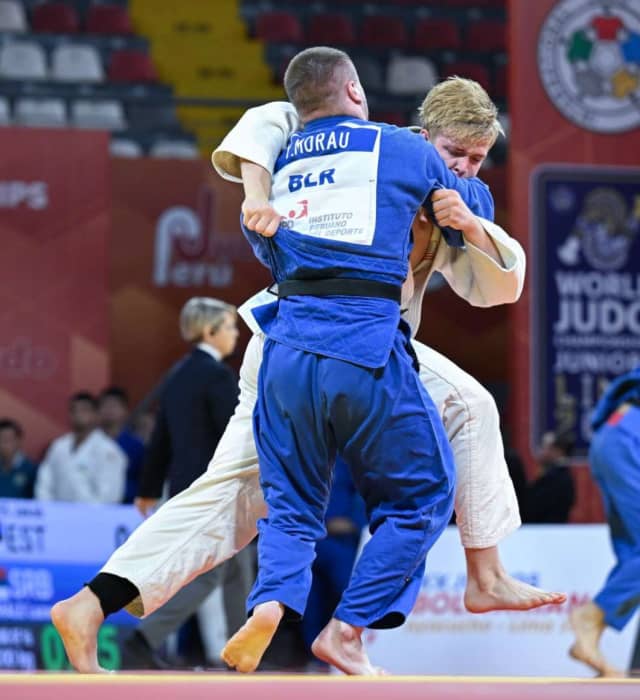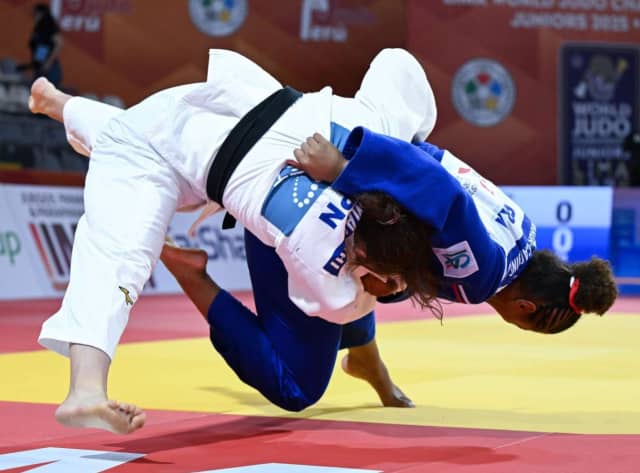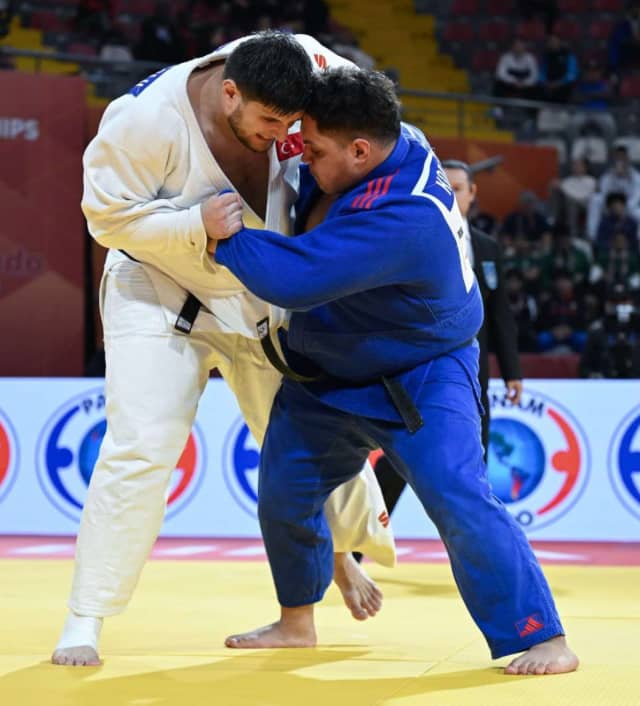-90 kg: Brazilian Power Shines Through
In the -90 kg category, Alisher Samanov (UZB), the world number three and top seed in Lima, carried the pressure of expectation on his shoulders. His opening contest against Maksim Gordeiko (IJF) was a tense affair, stretching into golden score before Samanov secured victory with a beautiful left ko-uchi-gari for ippon. The Uzbek judoka then overcame Paul Friedrichs (GER) to advance to the semi-finals, where he met Jesse Barbosa (BRA), a welcome boost for the Brazilian delegation, which had enjoyed a strong start on day one but had left the second day without a medal.
Elsewhere in the draw, another Brazilian judoka impressed. After the early exit of pool C favourite Cristiano Mincinesi (ITA), João Segatelle (BRA) seized the opportunity to advance to the semi-finals, joining his compatriot Barbosa in the final four. Completing the line-up was Luka Javakhishvili (GEO), who earned his spot with a clean hold-down victory over Vadim Ghimbovschi (MDA) in the quarter-finals.
With two Brazilians in the semis, hopes were high for a spot in the final or perhaps even an all-Brazilian showdown. Both Segatelle and Barbosa rose to the challenge, showing impressive technical control and mental composure under pressure. Their performances culminated in a dream scenario for Brazil: two judoka from the same nation set to contest the gold medal, a fitting reflection of Brazil’s growing dominance in junior judo.
-78 kg: Hanstede and Niemeyer Rise
The -78 kg category showcased the depth and competitiveness of European judo. France’s Lila Mazzarino, world number one and top seed, entered as a strong favourite, determined to add a world title to her continental crown. Confident and composed, she advanced smoothly through the rounds, demonstrating the precision and authority expected from the leader of the world rankings.
Her semi-final against Maria Hanstede (NED) promised a high-level contest between two technically refined judoka. The Dutch competitor, coming from another nation steeped in judo history, approached the bout with tactical sharpness, and it paid off. Against expectations, Hanstede outmanoeuvred Mazzarino to book her spot in the final, leaving the French star to settle for a place in the bronze medal contest.
The second half of the draw also confirmed Europe’s dominance in the category. Mathilda Sophie Niemeyer (GER) and Jovana Stjepanovic (SRB) battled their way through tough opposition to reach the semi-finals. Niemeyer’s consistent form saw her claim victory to join Hanstede in the final, ensuring an all-European showdown for gold.
Even in the repechage rounds, Europe’s presence remained overwhelming, with athletes from the continent filling nearly all positions, the only exception being Dandara Camillo (BRA), who carried South American hopes with a determined run.
As the dust settled, the stage was set for a final between Maria Hanstede (NED) and Mathilda Sophie Niemeyer (GER), a battle between two young judoka poised to define the next generation of European women’s judo.
-100 kg: Serbia Shows Its Strength
The -100 kg preliminaries offered a fascinating mirror held up to the -90 kg category, with one country once again placing two athletes in the semi-finals. This time it was Serbia, represented by Milan Bulaja and Lazar Zdrale, each delivering a flawless run through the elimination rounds.
As the world number one and top seed, Bulaja handled the pressure with calm authority. His performance was solid and controlled, earning him a place in the final after a convincing victory over Mukhammadali Zoirov (UZB) who himself had produced one of the standout performances of the day when defeating the higher-seeded Daniel Liubimovski (USA) in the quarter-final.
For Zdrale, the story was one of surprise and courage. Unseeded and not considered among the pre-event favourites, he began with a strong win over Osama Bu Qursayn (KSA) by strangle, before edging out Jakob Vares (EST) with a waza-ari and following that with a double waza-ari victory against Nodari Alapishvili (GEO). His momentum carried him into the semi-final against Shokei Hirano (JPN), where his run eventually came to an end despite a determined effort.
With Bulaja safely through to the final and Zdrale narrowly missing out, Serbia nonetheless confirmed its rising power in this division, guaranteeing itself a shot at gold.
+78 kg: Power and Precision in the Heavyweights
In the +78 kg category, all eyes were on Celia Cancan (FRA), world number one and top seed, already a double world finalist from cadet (Sarajevo 2022) and junior levels (Dushanbe 2024) combined. Determined to finally claim the world title, Cancan impressed throughout the preliminaries, demonstrating a sharp focus. She dispatched Ana Soares (BRA) first before defeating Hikaru Tamaguchi (JPN), who resisted briefly before being thrown for ippon cleanly.
France nearly secured a double semi-final presence, but Leonie Minkada-Caquineau fell to Yuli Alma Mishiner (ISR) after a tactical bout that was decided by penalties.
In the lower half of the draw, Safa Soliman (EGY) and Umida Nigmatova (UZB) emerged as the key contenders. The Uzbek judoka, reigning cadet world champion from Sofia 2024, once again showcased her trademark strength, pinning her opponent for ippon to reach another world final in quick succession.
Cancan joined her in the title match after a confident and controlled performance, setting the stage for a high-level final between two athletes at the peak of their form.
+100 kg: Heavyweights Deliver Power and Precision
The +100 kg preliminaries unfolded as a true showcase of heavyweight power and technical mastery, featuring four nations traditionally dominant in this category. At the top of the draw, world number one and top seed Fazliddin Rafikov (UZB) lived up to expectations, delivering a strong performance to reach the semi-final, where he met Gai Hatakeyama (JPN).
Before that, Hatakeyama had to work hard to secure his place in the last four. He first defeated Kanta Ueyama (USA) with two yuko scores before overcoming Andrey Coelho (BRA) in golden score with a well-executed hold-down. His quarter-final clash with Ibrahim Tataroglu (TUR), a powerful junior already active on the World Judo Tour, was a true test of strength and control, one that the Japanese judoka passed with authority.
In the lower half of the draw, France’s Matheo Akiana Mongo carried his country’s hopes, dominating the early rounds with confidence and precision to reach his semi-final, where he faced Bislan Katamardov, representing the International Judo Federation. Both men showcased a mix of raw strength and technical sharpness and set up, with Hatakeyama and Rafikov, two semi-finals with serious impact potential.
In the end, Hatakeyama managed to overcome Rafikov, keeping a steady grip on the contest to earn his spot in the final, while Katamardov narrowly edged out Akiana Mongo, who had looked close to victory before conceding a decisive yuko in the closing seconds.
The stage was set for a powerful and promising final between Gai Hatakeyama (JPN) and Bislan Katamardov (IJF), a clash of contrasting styles that promised to bring the heavyweight division to a thrilling close.

